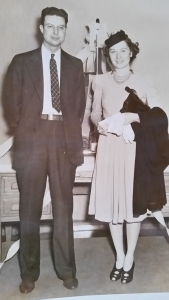
My mother, Bernyce Etna Young Sullinger was a 30 year old newlywed at the time of Pearl Harbor. She and her husband, William “Sully” Sullinger, were living in Hillsdale, New Jersey, a New York City suburb. Before her marriage, Etna grew up in Georgia, and Florida and trained as a nurse in Mobile, Alabama. Soon after she graduated, she moved to Chicago for career opportunities. While in Chicago she took post-graduate courses in Psychiatry and worked in both Cook County Hospital and Dr. Greenwood’s Sanitarium.
 Her life and career took a decided turn when in 1937 she applied for a job as a stewardess-nurse on the B&O Railroad. She was the first of 5 women hired to work on the Shenandoah line, running between Chicago and New York. This job was designed to encourage train travel by families, especially those with children, who would be aided by the attendance of a qualified nurse. In addition, travelers with medical needs were assessed and given attention either on the train or at upcoming stations, per the decision of the stewardess-nurse. The job of nurse-stewardess was tailor made for Etna. Gregarious but a great listener, devoted to those in need and a lover of children, she was a discerning nurse, able to diffuse emotional tension and was knowledgeable about illness and treatments. Etna was a great representative of the railroad.
Her life and career took a decided turn when in 1937 she applied for a job as a stewardess-nurse on the B&O Railroad. She was the first of 5 women hired to work on the Shenandoah line, running between Chicago and New York. This job was designed to encourage train travel by families, especially those with children, who would be aided by the attendance of a qualified nurse. In addition, travelers with medical needs were assessed and given attention either on the train or at upcoming stations, per the decision of the stewardess-nurse. The job of nurse-stewardess was tailor made for Etna. Gregarious but a great listener, devoted to those in need and a lover of children, she was a discerning nurse, able to diffuse emotional tension and was knowledgeable about illness and treatments. Etna was a great representative of the railroad.
On a trip in 1938 she met Sully, an electrical engineer who worked for the Western Union Telegraph Company. He traveled her route from Chicago to New York regularly for business. They had one date and fell in love. They married in August 1940. Etna had to quit her job as a stewardess. You couldn’t be married and be a stewardess at that time.
In Hillsdale, Etna has a short stint working for a VA Hospital about 40 miles away. The only shift available was evenings and she had a long bus ride to and from work. They decided to make ends meet relying on Sully’s salary. In those days he worked 6 days a week and sometimes half a day on Sunday.
When war was declared, Etna contributed to the stateside efforts as a volunteer. In addition to planting a victory garden, she joined the American Red Cross Nursing Service, took First Aid courses given by the Hillsdale Civil Defense and was assigned to a First Aid Station. Papers, pins and letters I have found among her possessions infer Etna’s participation in these activities. I wish I had firsthand stories to relate as others do but, alas, she died in 2009 before I was aware of the ARRA and its mission to honor the service and history of women during World War II. I do know that Etna came from a long line of women who volunteered selflessly for church and community. For example, her mother baked rolls and bread for her church which Etna delivered every week. After the war, Etna devoted her efforts to the Women’s Society of Christian Service of the Methodist Church and the Pascack Valley Hospital Association, which was raising money to build a local hospital. I have many memories of these activities. So it is not an imaginative stretch to picture her organizing Red Cross blood drives, packing bandages, making comfort kits for soldiers or patrolling dark streets to enforce blackouts.
When war was declared Sully was developing advanced communications at Western Union. After a thorough review of his qualifications and allegiances he was given the highest security clearance available to a civilian, presumably to promote secure communication between America and her overseas partners. Any work done for the war effort was kept secret from us. He took quite seriously the motto: Loose lips sink ships!
Etna’s younger brother Stewart Young was enlisted into the Army as a Second Lieutenant out of his senior year of college. He saw action in Belgium, at the prolonged Antwerp campaign, in France and finally Germany. His wartime experiences left vivid and painful memories which, like most veterans of the time, he kept to himself. He returned to Texas after the war and worked in the oil industry. Another brother, Clarence Walter Jr was employed building a highway in Guatemala, an effort seen to be of strategic importance.
Etna was an extraordinary volunteer all her life. Once committed to a course, she put unending energy into it, enlisting neighbors and friends to the cause, and tapping local churches and businesses for resources and support. Every Rosie story is unique but all have the same thread of selflessness and service that defines Etna Sullinger’s contributions. She didn’t recount wartime activities because she was never looking for the limelight. What she did look for during these times and for the rest of her life was meaningful work that contributed to the betterment of her community.
